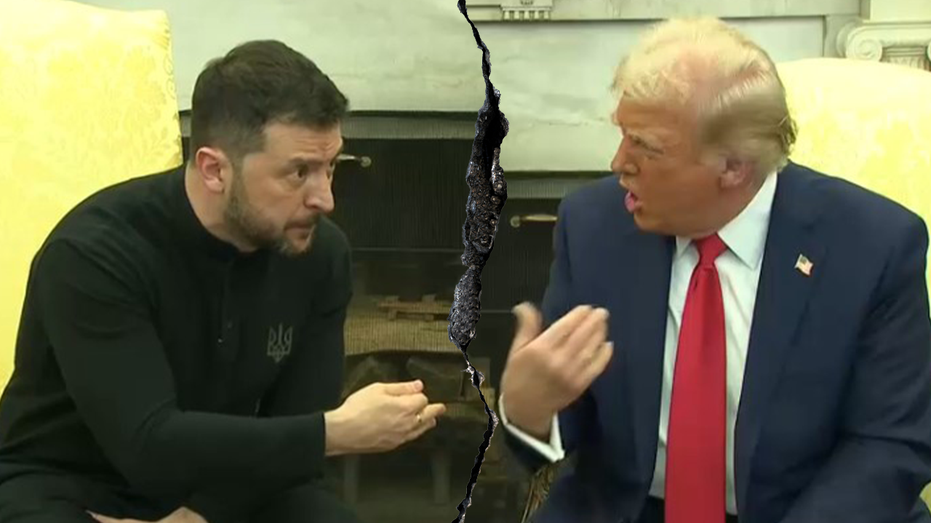Trump-Zelenskyy Shouting Match Threatens U.S.-Ukraine Ties and European Alliances

Sarah Johnson
March 4, 2025
Brief
A heated Oval Office clash between Trump and Zelenskyy disrupts U.S.-Ukraine relations, raises questions about American aid, and signals shifting global alliances and foreign policy priorities.
The fallout from the fiery Oval Office confrontation between Donald Trump and Volodymyr Zelenskyy has sent shockwaves through America's foreign relations, potentially jeopardizing not just U.S. support for Ukraine but also the broader transatlantic alliance. The meeting, which devolved into a shouting match that ended with Trump booting Zelenskyy out of the White House, has left diplomatic and political observers stunned.
Many in the media are pointing fingers at Trump, arguing that his actions have pushed U.S.-Ukraine relations to the brink. As Ukraine continues its fight against Russia's invasion, Trump’s cordial history with Vladimir Putin raises eyebrows. Let's be clear: the Kremlin is the aggressor here, not Ukraine. Yet Trump’s refusal to condemn Putin in strong terms remains a sore point, especially given Russia’s ongoing war crimes and territorial ambitions.
Reports confirm that the meeting went off the rails after Trump, apparently egged on by Senator JD Vance, lost his temper. The planned working lunch was abandoned, and instead of diplomacy, the White House witnessed an unproductive shouting match. Zelenskyy, in turn, made his own missteps, failing to stay composed and secure a much-anticipated agreement on rare minerals.
Trump argued during the clash that constant criticism of Russia’s leader would hinder any peace deal negotiations. A fair point, perhaps, but his reluctance to hold Putin accountable for past and present aggressions complicates that narrative. Meanwhile, Zelenskyy insisted on stronger security guarantees, citing Putin’s long record of violating agreements—from the 2014 annexation of Crimea to the brutal war waged over the last three years.
One thing is clear: Zelenskyy had one job in that meeting—secure the minerals deal—and failed spectacularly. Instead, he took the bait during the heated exchange, possibly damaging his rapport with Trump beyond repair. While Britain and France quickly rallied to support Ukraine after the debacle, promising peacekeeping troops, the U.S. president’s blunt warning about Ukraine’s dependence on American aid looms large. Zelenskyy simply doesn’t have the leverage without U.S. backing, a sobering reality.
Trump’s press secretary, Karoline Leavitt, didn’t mince words when defending her boss. In an interview, she described Zelenskyy as "antagonistic" and accused him of repeatedly interrupting Trump. While some of her comments stretched the truth, one thing was accurate: Zelenskyy refused to agree to a ceasefire. For him, a ceasefire would mean conceding Russia’s territorial gains. Still, what’s the alternative?
It’s baffling that such a high-stakes meeting wasn’t held behind closed doors. The back-and-forth with the press only escalated tensions, framing the dialogue in a way that invited grandstanding. Trump, ever the showman, later called the spectacle "great television." Transparency is one thing, but this felt more like reality TV than diplomacy.
The broader implications of this meltdown are troubling. David Sanger of The New York Times suggests that Trump’s actions reflect a deeper shift in his foreign policy priorities. His desire to normalize relations with Russia, even at the expense of rewriting history and sidelining NATO, signals a potential departure from the post-World War II alliances that have defined global stability for decades. Trump’s America First doctrine—popular among many Republicans—may resonate domestically, but it risks undermining the very alliances that have kept major powers in check.
All of this comes as U.S. aid to Ukraine faces increasing scrutiny at home. While Trump often overstates the financial support provided, the substantial aid package has left many Americans questioning its necessity, especially when domestic issues demand attention. The rare minerals deal could have offered a tangible economic incentive for continued U.S. support, but that opportunity now seems lost.
Ultimately, the stakes are higher than just U.S.-Ukraine relations. If Putin succeeds in carving up Ukraine, it would embolden him to target other neighboring nations. History shows that appeasement only fuels aggression. Trump’s approach, aligning closer to Russia while alienating Europe, could mark a turning point for the old world order—and not in a good way.
Adding insult to injury, Zelenskyy made headlines with a grim prediction that the war was "still very, very far away" from ending. Trump, unsurprisingly, pounced on the remarks, calling them "the worst statement" and warning that America’s patience was wearing thin. His cryptic comment that "if somebody doesn’t want to make a deal, I think that person won’t be around very long" adds another layer of tension to an already combustible situation.
What’s next? Your guess is as good as mine. But one thing’s for sure: the shouting match in the Oval Office may be remembered as a pivotal moment in America’s shifting role on the global stage.
Topics
Editor's Comments
Can we talk about how this meeting felt more like an episode of a political reality show than a serious diplomatic discussion? It’s wild that something as important as a rare minerals deal was sidelined by a shouting match. And Trump's 'great television' remark—classic him, but wow, not the best look for global diplomacy.
Like this article? Share it with your friends!
If you find this article interesting, feel free to share it with your friends!
Thank you for your support! Sharing is the greatest encouragement for us.



